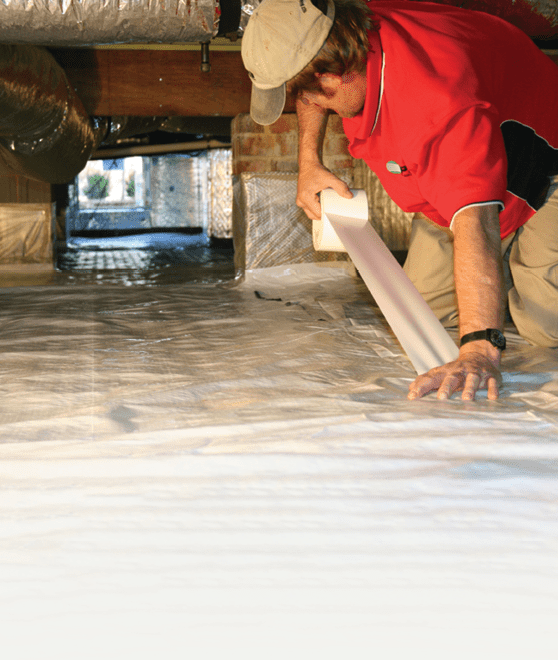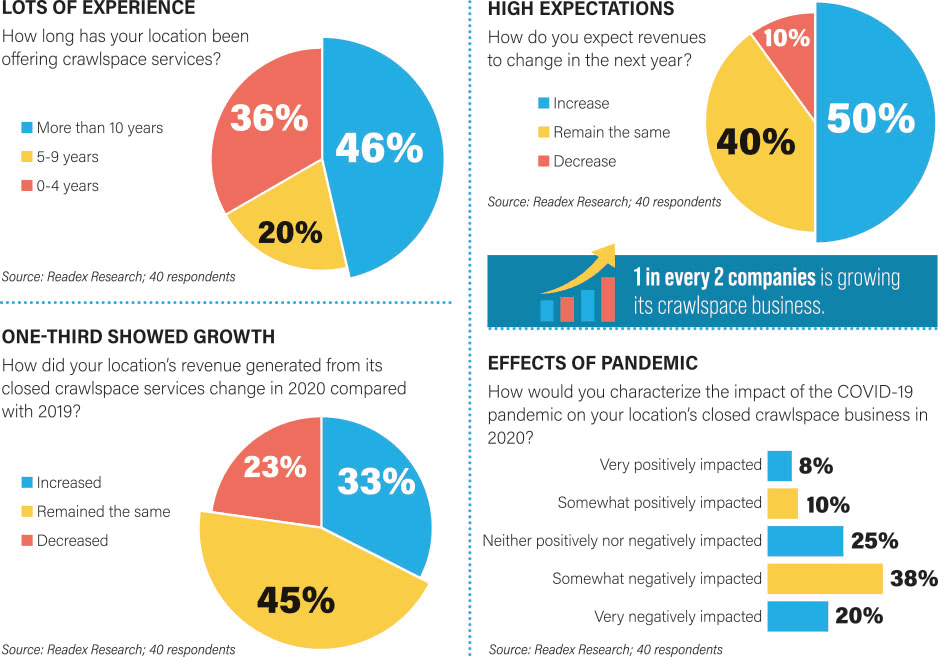
If you haven’t heard the news that the closed crawlspace market is riding high, it’s likely because you don’t operate in an area with basements or crawlspaces. Research by Readex Research, on behalf of PCT for the 2021 State of the Closed Crawlspace Market Report, says the closed crawlspace market continues to be hot. This report is sponsored by Crawlspace Depot.
Not only did the market grow last year, during the height of the COVID-19 pandemic, but the market also expanded percentage-wise and is still on fire well into 2021.
Chris Brasure, owner of Brasure Pest Control in Maryland and Delaware, said closed crawlspaces continue to represent big growth for his company. “In our area there are not a lot of slabs; maybe 80 percent are crawlspaces, so we’re growing very rapidly,” he says.
But closing crawlspaces is not limited to certain regions. If there’s a crawlspace, there’s a market — it’s as simple as that. While many PMPs have to seek out new business opportunities to grow, Trent Heard saw the crawlspace market start to grow based on existing customers calling him for advice on mold and moisture problems. So Heard took that as a sign and started to go full-speed ahead closing crawlspaces with his company United Pest & Turf Control.
The result? A busy, growing pest management business that is providing not only crawlspace services but general pest, termite and mosquito control throughout Alabama and Tennessee.
“We are still seeing that growth; we grew over 23 percent last year,” he says. “A lot of our workforce was able to work; we’re so close to Huntsville and many were working from home. There wasn’t a shortage of money, and there were a lot of people working from home.” He added that customers were concerned about healthy living spaces, clean air and allergy issues.
Chad Reese of American Termapest in Greenwood, S.C., says his firm has substantially grown this add-on business over the last few years.
“Our closed crawlspace business has grown quite a bit. I would say we have tripled our moisture control work,” Reese says. “The good thing is that other than doing the training, it’s a minimal investment. (It’s great) as long as you do it correctly, do your homework and understand why you’re doing it, and to make sure to use quality materials.”
Billy Tesh, president of Crawlspace Depot, says there are a number of factors why the closed crawlspace market continues to grow.
“From a consumer standpoint, the reason you’re doing this service is to protect your largest investment, and that’s what the industry does with wood rot and moisture,” says Tesh. “That’s a big plus for both the PMP and the consumer, and the big offset is that you get energy savings of up to 15-18 percent and indoor air quality improves. Then you have better pest control too. It’s also about offering a service that your customers could go somewhere else for if you don’t do it.”
By performing a yearly renewal, during which the whole system is inspected to ensure everything is functioning properly, PMPs are creating a long-term relationship with that customer.
“The industry is growing because you’re creating a long-term relationship with that customer and then continue with the renewal. There’s an incredible value in renewals and keeping customers connected,” Tesh adds.
Being able to deliver and explain what you’re delivering is incredibly important, Tesh says.
“It’s your responsibility to make sure you establish yourself as a leader in closed crawlspaces,” Tesh says. “The consumer is very educated; you need to align yourself with a system that’s effective. I once saw competing installers bid on a job where their prices ranged from $4,700 to $17,000. The pest management firm that secured the job had a bid for $15,000. The key to why they got the job was because they explained in detail what they were doing and the homeowner understood they were offering added value to the closed crawlspace system that was being installed.
“If you don’t and can’t explain it, then the homeowner doesn’t understand that. You need to outline what you’re doing for your job, or someone else will,” he adds.
Many PMPs are expanding the commercial side of their businesses as well. Firms have started performing closed crawlspace work in commercial buildings, including town halls, schools and other facilities. But all PMPs interviewed encourage caution: Walk before you run. Don’t start with the largest commercial job out there. First, sell to your existing customer base and make them happier while you learn the techniques required to effectively close your area’s crawlspaces.
Heard says it’s important to be able to do good things for people. “Many times, we’re doing this work because this is their air quality; this is what your kids are breathing. We never use scare tactics, we just try to present the facts. I haven’t had to establish trust because we have so much referral business. Our customers trust us.
“That’s the beauty of our industry: We can make a good, solid living helping people (and) solving problems. That’s something you can feel good about,” he adds.


Explore the October 2021 Issue
Check out more from this issue and find your next story to read.